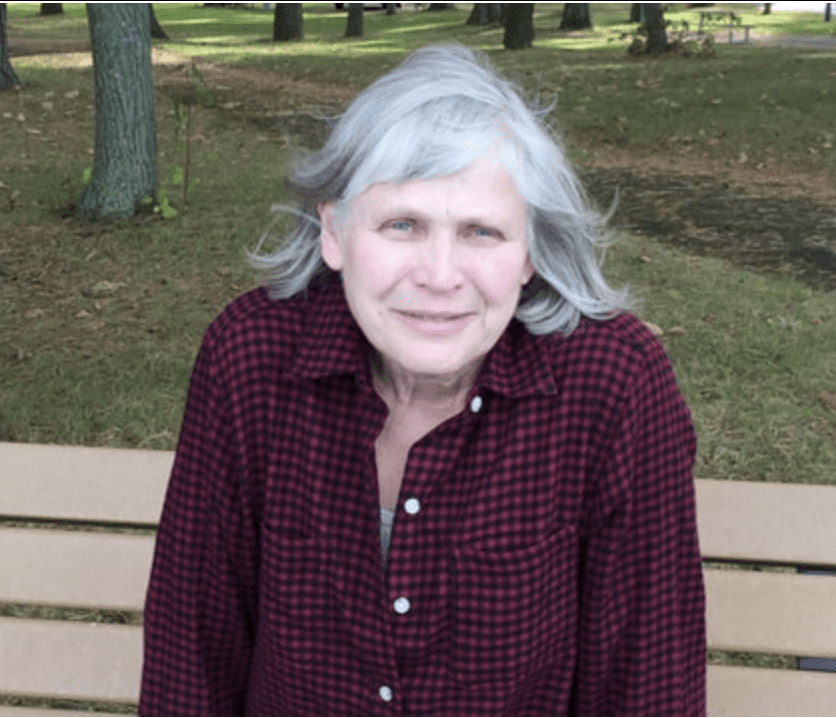
March 25, 2022 By Thomas E. Belyea
Fifty years ago this year, “Two girls” crossed the finish line to become the first women to run Hingham’s July 4th Road Race. They ran into history, and were in the lead pack of women distance runners advocating for gender equity.
When Hingham Marathon Chairman Paul Hickey reported that “Two Girls” had crossed the finish line in 1972, it was a first and history in the making for Hingham’s fourteen year old July 4th Road Race. Hickey carefully recorded, “ A field of 34 runners, including two girls, went to the line under ideal conditions. Two sisters, running for the first time in Age group II were Charlotte Lettis, a UMass student, and New England Intercollegiate Cross Country Titlist, crossing the line in 24:17(4.3 miles), and her sister Paula, a Hingham High junior, checking in at 30:38.” Hickey knew this was a first, since he had been “Marathon” Chairman since 1968, and had helped prior Chairman, James Kersey, run the event. Other than this brief acknowledgement, these “Two Girls” were never honored as the first women to break new ground for this achievement. Gender categories by age groupings would not be officially established until 1977.
The entry of the first women in Hingham’s road race coincided locally with the establishment of the Hingham High girls track program, and with the passing of the federally mandated Title IX educational amendment, which prohibited gender discrimination .This top down law took years for many communities to fund with local taxpayer dollars, At the same time nationally, with the explosion of American women entering distance racing events, the grassroots groundswell of participants appeared before the core infrastructure of some womens’ sports networks could be created.
The Boston Athletic Association officially recognized marathon women in a separate, competitive gender category in 1972. However, it was the groundwork of Bobbi Gibb(1966, 1967) and then Karen Switzer(1967) who, by disguising their gender, broke the barrier by beating men before Boston officials seriously considered women as competitors. These single, separate, individual acts of conscience were the sparks of the women’s running revolution.
The Lettis sisters’ first of firsts was an introduction for what was to come, and any perceptions that yesteryear’s women in Hingham’s road race were not quality runners would be put to rest. The Lettis sisters came back separately in later years to win the Women’s Overall decisively and receive full recognition as champions. Charlotte’s remarkable 26:25 win at Hingham in 1977, following the same course route as today’s race, was 5.3 tenths of a mile longer(5 miles) than today’s 4.47 mile distance. Her time remains as one of the best ever for the event. Moreover, it was a warmup for her second place showing that August in the five year old, 7 mile, Falmouth Road Race, besting an aspiring Olympic Gold Medalist(1984) and Boston Marathon winner(1979, 1983), Joan Benoit, but behind the winner of the day, Kim Merritt. All three top women runners that year set a new course record at Falmouth, which even then was a reality test for the best in competitive running. Although her sizzling times at Hingham and Falmouth were breathtaking, Charlotte Lettis drew national attention just two weeks before her 1972 win at Hingham, becoming the first woman ever to win the prestigious and grueling Mount Washington Road Race, a seven mile uphill run,” into the clouds”.

Charlotte’s sister Paula came back to win the Women’s Overall ten years later in 1982, the 24th year, as Paula Lettis-Meyer. Her husband, Greg Meyer, won the Men’s Overall that year also, making them the first husband-wife duo on record to take home such an honor. The following year, 1983, Greg Meyer went on to win the Boston Marathon(2:09:00). and held the honor of being the last American to win for 31 years until “Meb” Keflezighi claimed the title( 2:08:37) in 2014.
The phenomenon of women runners as athletes emerged slowly at the local level. As funding became available, high school, then college programs developed, and running clubs thrived. The Lettis sisters’ presence at the finish line gave the go ahead for more women of all ages to enter Hingham’s Road Race. Finding the right way to recognize women as equitable competitive runners proved to be a challenge. Wendy Anderson, a Hingham High senior and product of the girls’ track program, was given a corsage for her 31:43 victory in 1973, in a field of 32 male and female entrants. Prizes in other early races included doll(miniature) furniture, and silver tea sets. Many women had to run and win multiple times in order to be equitably recognized. In 1974 Wendy Anderson placed second behind Nina Lamborghini, a high school athletic standout. In 1975, in the best of sportsmanship of the day, Wendy and her sister Allyson tied in a 33:10 “Dead Heat”, reminding us that victory has more than one meaning. No women were recorded in 1976 as having entered or completed the race.
By 1977, the 19th year, women runners were a regular feature in Hingham’s Road Race with 18 female entrants, and the first separate women’s category was established. This same year the all time champion with the most wins ever was about to surface. LeilaStaunton Walden came in second in 1977, but went on to win the Women’s Overall in ’78, ’79, and ’80. Her record of three Overall Wins and 9 wins in the 30-39, 40-49, and 50-59 age group categories, spanning a 24 year period and ending in 2002, remains unmatched today, in both male and female categories.
The event has showcased notable Hingham female athletes who went on to become key figures in women’s intercollegiate sports . In 1985, Nina Lamborghini(1974 winner), field hockey and lacrosse coach at Tufts University, coached her lacrosse team to become the ECAC #2 team in the nation. She also served as coach in the U.S. Olympic Field hockey Development Camps for a number of years. The 1998 Women’s Overall winner, triathlete Kelly Amonte, is lacrosse coach at #1 Northwestern.
Charlotte Lettis became a national caliber runner in women’s distance racing in the seventies. In 1975 she placed 5 th in the National Cross Country Championships, and won the inaugural all women’s L’Eggs Minimarathon in New York city. Ranking nationally in the mile and 1500, she made the 1976 Olympic trials. She is now a retired head coach of the Lincoln HS Track and Field Program in Portland, Oregon. Having coached women of all ages in distance running.for over 45 years, her experiences in breaking the gender barrier led her to become an author and filmmaker. Her 2005 documentary, “Run Like A Girl” is about three generations of women distance runners, covering the fifties to present day Her personal account was featured with 22 inspiring profiles of “Rebels, Rule breakers , and Visionaries Who Changed the Sport” in the publication, “First ladies of Running,” written by distance running celebrity Amby Burfoot.
The last Women’s Overall Winner from Hingham was Emily Bryson(2017,’18,’19), who joined former three time winners Christina Seremetis Campbell(’05, ’14,’16).and Leila Staunton Walden(’78,’79,’80), with one time winners Linda Sheskey(25:37-1988), Charlotte Lettis(26:25-1977)and Laura Boer(’13). In 2003, Hingham’s own Jennifer Fay won in 29:03, but her best time(28:15) came in a 2004 heartbreaker, and was not enough to edge Scituate’s Holly Madden(28:10), who won the Women’s Overall crown four times(’04, ’08, ’10,’11).. High school standout Allison Donovan had back to back victories in 1999(30:23) and 2000(28:39, crossing milleniums,.
These were the first women of Hingham’s Road Race. The above information was retrieved from microfilm copies of original Hingham Journal accounts written shortly after events occurred. Additional information also came from: The Hingham Journal’s “Yesterdays” column, Falmouth Road Race records, Yankee Magazine, public domain and other sources, including Hingham High School yearbooks.
For more history on this event, Google: Hingham Journal Historical Perspective July 4th Road Race. Tom Belyea is Historian of the July 4th Road Race.

